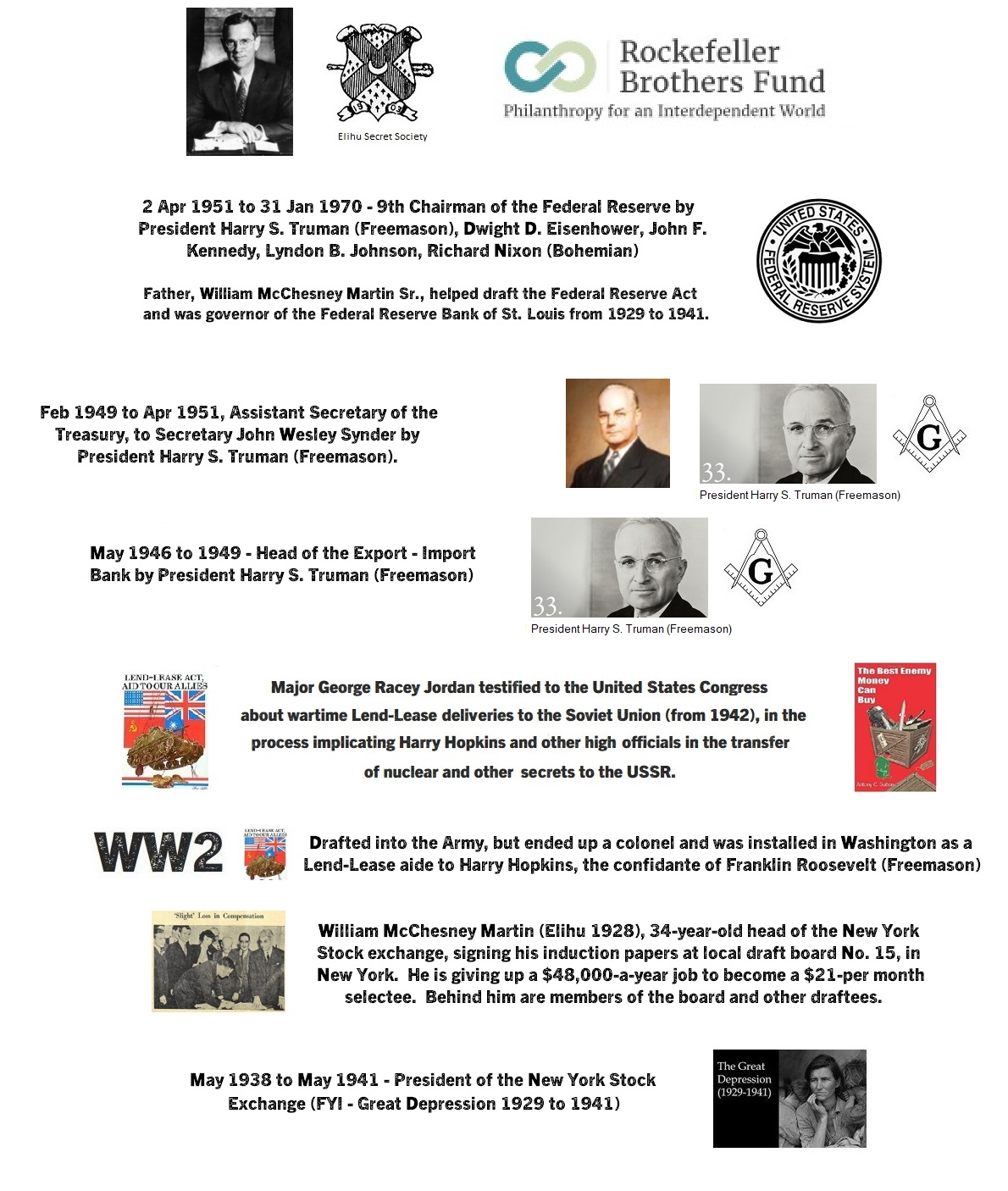
William McChesney Martin Jr. (Elihu 1928)
Democratic. Banker. Yale University. Elihu. Columbia University.
After leaving the Board of Governors, Martin served on the boards of several corporations and nonprofit organizations, including IBM, American Express, and the National Geographic Society. He also worked as a lawyer at Riggs National Bank in Washington.[4]
President John F. Kennedy had told Mr. Martin in 1961 that most of the Kennedy advisers wanted a new Fed chairman and questioned him closely about whether he intended to ‘flaunt’ the independence of the Fed. In the end, Mr. Kennedy asked him to stay on and explained that he did so because ”responsible men” were not easy to find.[5]
In one of his most controversial moves, in December 1965, Mr. Martin voted to raise the discount rate — the rate at which commercial banks borrow from the Fed — despite President Lyndon B. Johnson’s objections. After the vote, he was summoned to Johnson’s ranch. He soon emerged to say that the meeting had changed neither man’s mind.[5]
Mr. Martin set the course of the nation’s monetary policy during an economic golden age. His tenure included the nation’s longest economic expansion, from 1961 to 1969. That growth period ended when the central bank was forced to begin raising interest rates to fight the rising inflation that was caused by Government spending during the Vietnam War.[5]
2 Apr 1951 to 31 Jan 1970 - 9th Chairman of the Federal Reserve by President Harry S. Truman (Freemason), Dwight D. Eisenhower, John F. Kennedy, Lyndon B. Johnson, Richard Nixon (Bohemian)
Preceded by Thomas McCabe (Book & Key. Delta Upsilon) Succeeded by Arthur F. Burns (Phi Beta Kappa).
Feb 1949 to Apr 1951, Assistant Secretary of the Treasury, to Secretary John Wesley Synder by President Harry S. Truman (Freemason).[4]
Instrumental in helping negotiate the March 1951 Treasury-Fed Accord. That agreement gave the Fed control over monetary policy and ended its obligation to monetize the debt of the Treasury at a fixed rate. One month after the Accord was signed, President Truman appointed Martin chairman of the Board of Governors.[4]
May 1946 to 1949 - Head of the Export - Import Bank by President Harry S. Truman (Freemason)
WW2 - Drafted into the Army, but ended up a colonel and was installed in Washington as a Lend-Lease aide to Harry Hopkins, the confidante of Franklin Roosevelt (Freemason).[3][7]
WW2 -Pictured - William McChesney Martin (Elihu 1928), 34-year-old head of the New York Stock exchange, signing his induction papers at local draft board No. 15, in New York. He is giving up a $48,000-a-year job to become a $21-per month selectee. Behind him are members of the board and other draftees.[3]
May 1938 to May 1941 - President of the New York Stock Exchange.
Preceded by Charles R. Gay. Succeeded by Emil Schram.
WW2 - 1941, drafted into the US Army. By the end of World War II, he was a colonel and was nominated by President Harry Truman to lead the Export-Import Bank of the United States.
New York Stock Exchange Representative, A.G. Edwards & Sons.[4]
Statistics Department of A.G. Edwards & Sons.[4] (founded 1887 by Albert Gallatin Edwards, West Point graduate. US Assistant Secretary of the Treasury by President Lincoln in Apr 1865. Abraham Lincoln died 15 Apr 1865).
Bank examination department of the Federal Reserve Bank of St. Louis.[4]
1928 - Graduated Yale, Elihu.
Died 27 Jul 1998, from Heart Attack. Age 91
Note: Father, William McChesney Martin Sr., helped draft the Federal Reserve Act and was governor of the Federal Reserve Bank of St. Louis from 1929 to 1941.[4][5]
[2] - Wiki - William McChesney Martin (Elihu 1928)
[3] - Find a Grave - William McChesney Martin (Elihu 1928)
[4] - Federal Reserve History - William McChesney Martin (Elihu 1928)



Comments